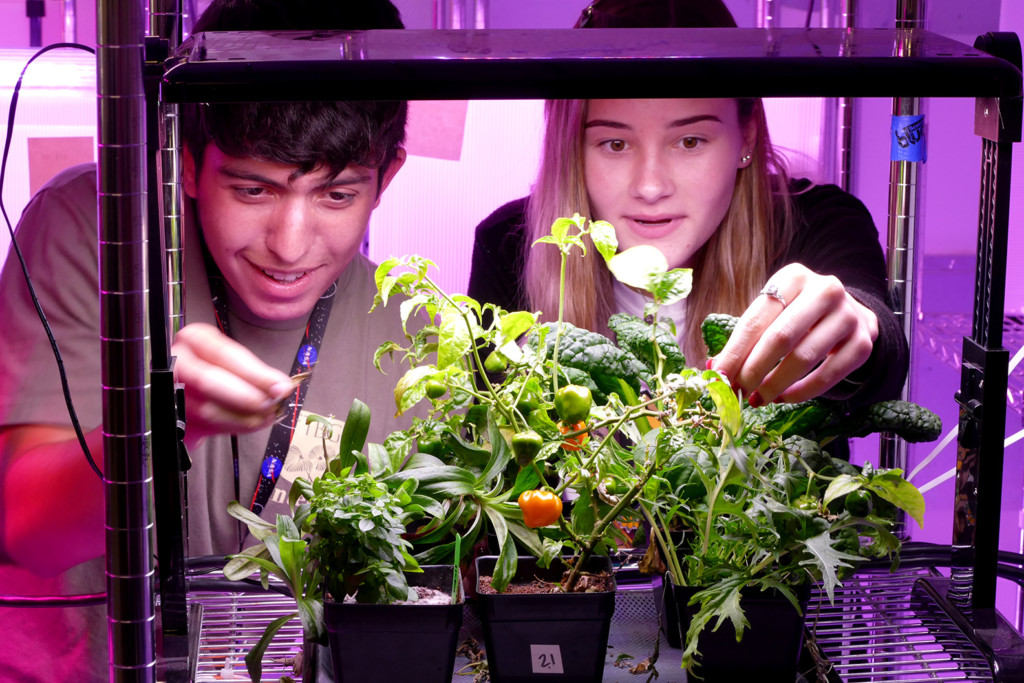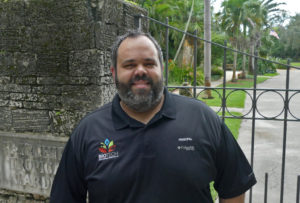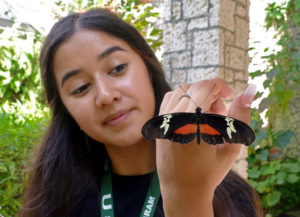
MIAMI – Christopher Bermudez likes plants. Like, really likes plants. The thought of reviving a droopy sprig of mizuna inspired the 17-year-old to riff: “When you kind of have faith in the plants, and you keep taking care of it, and you see it spring back up to life, that’s one of the biggest fulfilling feelings ever.”
How gratifying for Bermudez that he gets to pair that infatuation with real-world research. Among other projects, he and his classmates at BioTECH High School are helping scientists with a mammoth, years-long venture to determine which cultivars of edible plants will make the best crops for – no joke – space travel.
“Our research helps supplement their research,” said Bermudez, who’s aiming for a career in experimental horticulture. “You’re kind of helping the future of our species.”
BioTECH and its lovable science geeks make for a compelling narrative. So does the back story.
First pan to Florida, which has expanded charter schools, private school scholarships, education savings accounts and other varieties of educational choice as much as any state in America. Then zoom in to Miami-Dade County, home to a forward-thinking school district that chose to surf this “tsunami of choice” rather than fight it. The result is a rich, evolving, educational ecosystem where a slew of new educational cultivars are vying to find their niches.
If the theory holds, ever more students will choose from ever more options – including district choice options like BioTECH – to find the one that fits their needs and fuels their passions.

“Choice is very important in human nature, right? And I think that for students, choice is of utmost importance,” said BioTECH principal Daniel Mateo, a chemist by training. “When you force a child to do something, it never really works out quite the way you think it’s going to work out. But when you give them the flexibility of choice, you allow them to select what it is they want to do based on that natural affinity that they have for that particular subject. It’s a given. They’re going to perform.”
BioTECH, all of five years old, is a magnet school and the nation’s only high school specializing in conservation biology. Its aim: to develop successive generations of researchers who will apply their ingenuity and training to the conservation of life on Earth.
Heady stuff. Which makes it all the more remarkable, maybe, that BioTECH has no entrance requirements; serves a student body that is mostly low-income; and shares a campus with a once-struggling middle school.
Richmond Heights Middle, 14 miles southwest of gleaming downtown Miami, was perpetually C-rated by the state. Over the years, scores of school choice options mushroomed around it – and parents responded accordingly. Enrollment fell by half.
In turn, the Miami-Dade school district responded accordingly. It considered what academic programming students and parents wanted; what college degrees and jobs were hot; what community partnerships it could forge or strengthen. With help from a $10 million federal magnet schools grant, BioTECH was born.
The middle school is home base. But BioTECH’s 400 students spend big chunks of time doing research at three partner institutions: Zoo Miami, Everglades National Park and Fairchild Tropical Botanic Garden. Their lab equipment is college-caliber. Half their teachers are working scientists. They’re expected to shoot for publication in a scientific journal by the time they graduate.

Some of BioTECH’s “junior scientists” are studying the intestinal flora of spider monkeys to develop diets that make captive monkeys less prone to stomach problems. Others, like Bermudez, are doing research for Growing Beyond Earth, a partnership between Fairchild and NASA. Still others work in micropropagation labs at Fairchild, growing rare orchids that can be reintroduced into slices of South Florida where they once thrived.
“Who thought plants could be so fun?” said senior Peyton Ecklund.
Ecklund, 17, who plans to pursue botanical research in college, chose BioTECH over other high-performing schools in Miami-Dade. She liked that it was “trying to do something special” and emphasized student-driven learning. “We have to make the projects from scratch. And we have to figure out what works and what doesn’t,” she said. “If you learn how to be independent and figure it out on your own now, who knows what you can do in the future?”
Judging by demand, BioTECH is a smash. Last year, it reeled in 600 applications for 150 seats. So far this year, it’s on pace for 1,000 applications for 100 seats.
It’s no surprise the school took root in Miami. Miami-Dade has the highest rate of charter school and private school students of any urban district in Florida. It has one of the highest rates of students exercising district choice. More than 60 percent of Miami-Dade students are now enrolled in hundreds of district options, from magnet schools and career academies to international programs and K-8 centers.
“We recognized … the choice tsunami was upon us,” Superintendent Alberto Carvalho said in April. “And I was not going to do what lot of my colleagues did. Which is, ‘Let’s hope and pray it doesn’t hit us.’ “
BioTECH earned an A from the state this year. (Richmond Heights earned a B.) Its demographics mirror the district’s. Eighty-nine percent of its students are non-white (it’s 93 percent for the district). Sixty-three percent are eligible for free- or reduced-price lunch (it’s 66 percent for the district). Forty-two percent, meanwhile, receive special education services or accommodations.
“That’s 100 percent by design,” Mateo said. “It’s not about having elite students … If you have a passion (for science), we can cultivate that.”
The district does not provide transportation to BioTECH. That’s not a plus for equity. But HVAC repairmen and nursing assistants find a way to get their kids there just like radiologists and military officers do.
Daniella Lira, 17, a junior at BioTECH, said her parents left poverty in Peru for a better life in the U.S. A love for animals and a desire to be a veterinarian led her to the school. Diving into hands-on science has her considering other possibilities.
“Being part of the research and being treated as an actual scientist has opened my eyes,” Lira said.
BioTECH should open some eyes, too. There’s no end to the variety that can sprout in choice-rich soil.
https://www.youtube.com/watch?v=gDmOT7P-Aso&feature=youtu.be


